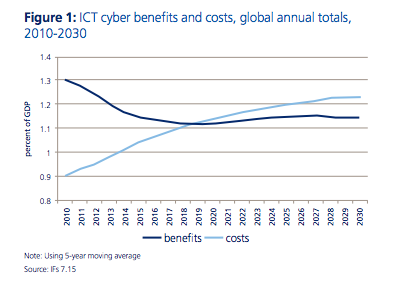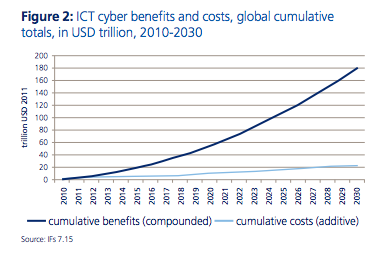In the techno-utopia envisioned by today’s Silicon Valley entrepreneurs, investors, and ideologues, seemingly nothing can stop the onslaught of Progress as writ through connected electronics. In this system of belief, networked computers will rule the future. Their merits are ineluctable, unshakeable, and obvious.
Connect, they say. Remove obstacles. Achieve efficiencies. Grow, grow, grow.
While there is no doubt that information and communication technologies (think Apple (AAPL), Google (GOOG), and Microsoft (MSFT) products) have unlocked tremendous economic value for businesses and countries all over the map, there is a threat looming above that otherwise idyllic dreamscape. You guessed it: cyberattacks.
The security of these connected systems is often lacking. Just look at any of the major data breaches that have walloped industry and the public sector recently: Target, Chase, Anthem, Sony, the Office of Personnel Management, and so on. These incidents lead one to wonder: Might the cost of breaches ever outweigh the benefits of connectivity?
That’s the question the Atlantic Council, an international affairs think thank based in Washington, D.C., set out to answer in a study released this week. The report’s conclusion? “A future where the annual costs of being connected outweigh the benefits is not only possible, it is happening now,” the authors write. “This is the bad news.”
Gasp! Has the promise of the digital revolution been an elaborate lie all along?
Not quite, the authors proceed. In their model, the advantages of connectivity accrue, while the costs strike as one-time expenses. By their accounting, connectivity still wins.
Although the one-time costs of being connected are higher on an annual basis, benefits accumulate over time, as they tend to be made as long-term investments in productivity. In other words, cyber benefits tend to keep delivering each year after they are originally felt, whereas the costs tend to be experienced as ‘one offs.’
In other words, while costs are poised annually to outstrip the benefits as a percent of global gross domestic product as early as 2018, by the report’s estimate, “the accumulated [emphasis Fortune’s] global benefits of being connected should still outpace the costs through the year 2030″ by nearly $160 trillion. The figure represents an 8% uptick in the world’s cumulative gross domestic product through the three decades following 2010. Not bad.


As with any projection of future costs in cyberspace however, such studies come with grains of salt by the silo-full. They rely on lofty assumptions. The non-compounding costs of insecurity, for instance, seem non-obvious to this author, or at least conveniently simplified. Sure, such adverse events have been dealt with as one-offs, historically, but will that remain so moving forward? Might not all this leaked data have potentially unforeseen, compounding ramifications? No one can say for certain.
Another uncertainty: The Atlantic Council’s model devises four distinct scenarios, or “cyber futures,” which depend entirely upon how global Internet governance plays out in the coming years. These involve cutely named propositions. There’s Cyber Shangri-La (all the hackers unplug, pack up their laptops, and head home), Leviathan (governments lock down digital borders and impose state regulations), Clockwork Orange (ransacking runs rampant), and Independent (companies and other entities police the Internet and fight back against their tormentors). Which way the world will turn is anyone’s guess (although some outcomes seem likelier than others).
“The future is of course not likely to look like any one of these four futures,” the authors concede in an accompanying FAQ. Instead, they “help us to conceive of how the future might look different from today, and steer towards those which are most beneficial.”
The report’s predictions—far from definitive—are worthwhile lodestars. Give it a read, get your bearing, and consider it an exercise in prognostication.
For more on cybersecurity, watch the video below.
Subscribe to Data Sheet, Fortune’s daily business-tech newsletter.













